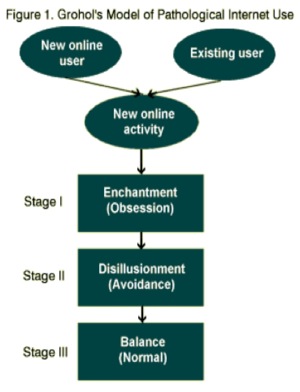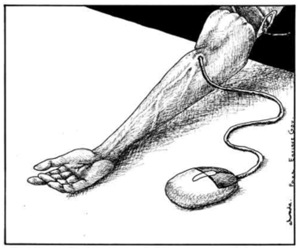
The Online AppealMegan Willoughby While the modern medical world has found its way around numerous epidemics, diseases, and psychological problems, there are still a few illnesses that threaten the lives of thousands. Along with the “obesity epidemic” our generation faces, there is yet another threat looming on the horizon: Internet addiction. The relationship between organism and machine is an occurrence that dates back to the invention of the bicycle. When a human becomes “one” with a machine—whether that machine is a car, a silicon implant, a vaccine, or in this case, a computer—the human is referred to as a cyborg. Internet addiction occurs when an individual is no longer able, or simply refuses, to separate from their cyborgian self. The worlds available to them online, it seems, are much more appealing than whatever the real world has to offer. It's clear that Internet usage and addiction is on the rise, but there are both positive and negative elements that contribute to this online appeal.
Internet addiction is a relatively recent diagnosis, as the online world has not been around for very long, but it is an addiction nonetheless. According to John Grohol, a writer for the site Psych Central, online addiction is no different from any other type of addiction. It is a form of escapism – a way to avoid reality. Just as one might turn to a novel or the television as an escape, others choose the Internet. Grohol explains the psychological phases a new user goes through upon entering the cyber world. First, there is obsession, where the new user cannot get enough of the countless worlds and websites the Internet has to offer. Second is disillusionment; the honeymoon period is over and the new user finds that they have better things to do. The third step is balance. At this point, the new user is no longer obsessed with the Internet, but finds it useful for socializing and/or work. A person who reaches the third stage is capable of connecting with and disconnecting from their cyborgian self without any psychological repercussions. They don't think about being online whenever they are not, nor do they get antsy when they are away from their computer. Grohol explains that Internet addiction emerges when a new user is unable to move past the first stage. Instead of acclimating to the wonders of the Internet, they remain in a constant state of awe. In recent years, the most addictive, “awe-inspiring” sites are the ones that offer individuals a chance at the life that either never was, or never can be. These massively multiplayer online role-playing games, or MMORPGs, have harnessed a large following, and it's really no surprise. If you were offered a way to become instantly gorgeous, thin, and tall, with no surgery, and no down payments, you'd be stupid not to agree, right? If the real world were nothing but a day-to-day struggle, any escape would be welcome, so why not have everything you dreamed of in a second, separate life? Thus, the creation of the multi-million player MMOG, Second Life. Created by Linden Lab, an American computer company, Second Life offers anyone and everyone the opportunity to have the life they always wanted. The game itself is free, which makes it very easy to access; however, mastering the game takes time, and often, money. While it is not necessary to buy anything in Second Life, people often choose to purchase “cool” clothes, intricate buildings, and other items that would otherwise take hours to create. For example, well-functioning avatars (the characters people use to represent themselves) are difficult for new players to construct, so other Second Life players jump at this opportunity to make themselves some money. An experienced user can create avatars that look good and function smoothly within the game—two key features a new user would have difficulty replicating themselves, as they are unfamiliar with the software— then sell their well-functioning creations. And it isn't only gamers that have noticed the economic potential of Second Life. Large brand names such as Nike and Gucci quickly realized that people want brand name products, even if the items they own aren't tangible. One man interviewed by BBC News makes a living off Second Life by designing office space for companies who want to be featured in this ever-popular world (BBC).
Online gaming has been around for less than 50 years, and interactive online gaming has been around even less; but in that condensed period of time, it has nudged its way deep into the lives of millions. Computers have advanced rapidly in the modern world, and people have been quick to adapt. For some, online gaming, while they know it is not “real”, provides enough stimulation to be taken very seriously. One video clip from the British Channel 9 News depicts a young World of Warcraft addict. He spends hours and hours in his online world, but he isn't alone. With the use of his headset and speakers, the boy, Cameron, can communicate with other members in his guild, a small community within the game. Unfortunately, Cameron spends up to sixteen hours playing World of Warcraft, neglecting both his schoolwork, and his real world relationships. For Cameron, life as a cyborg is much more appealing than life as an average teen, something his mother doesn't seem to understand. She is unsure of how to deal with his problem—but she, too, is not alone.
In China, Internet addiction has hit new heights, and parents there are just as lost as parents in the US. In China, however, parents turned to military style camps devoted to “fixing” addicted youths. Unfortunately, “the Chinese Ministry of Health [said] none of the private rehab clinics [were] legally registered” (CNN), and after the deaths of several youths, it became clear that “counselors” were beating their campers in order to rid them of their addiction. Wu Yongjing, the man who created the camps, even admitted to the use of "physical punishment” (CNN). So it's clear that these “camps” aren't helping youths with their Internet addictions. However, are youths the only demographic suffering from this illness? A BBC special titled “Wonderland: Virtual Adultery ad Cyberspace Love”, made it clear that youths are certainly not the only people afflicted by Internet addiction. Nearly every person interviewed for the documentary was over the age of thirty-five, and extremely unhappy with their real life. The hours spent online were beneficial for some, like the couple interviewed for the special who met and later got married in Second Life and in the real world; yet for others, the hours spent online tore them away from their families and friends. In 2008, a Japanese woman was accused and arrested for killing her online husband. This wasn't a normal “murder”, where a person was actually killed; in fact, all that occurred was the termination of the recently divorced man's avatar, due to hacking. There was no real life murder, nor was a real-life murder ever formulated. However, this didn't stop repercussions from crossing over into real life. This woman faced up to five years in prison for her actions (Times). An addiction is defined as “the state of being enslaved to a habit or practice or to something that is psychologically or physically habit-forming…to such an extent that its cessation causes severe trauma” (Dictionary.com). The appeal of the online world makes sense, but as the stories above depict, and the definition above states, too much of a good thing can be detrimental in the long run. This cyborgian relationship between human and computer can become unhealthy, and in some cases, dangerous. Gamers become dependent on their computerized selves, since these figures can do everything the tangible body cannot. The lives they have created and the people they have surrounded themselves with are everything the real world could not provide. The “friends” they socialize with see only what the gamer wants them to see. In other words, when a person is online, they have complete control. And just like the song “New Friend Request” by Gym Class Heroes goes, online there's “no gym class status, just Travis”. No one would know if you were the class nerd, or obese, or even if you have a missing arm or leg.
One could argue that a person's Internet personality is their true essence, because it is exactly how the individual sees himself or herself. Why shouldn't individuals be able to represent themselves as tall and beautiful? Beauty in the real world (physical beauty) has nothing to do with what is in a person's heart. How a person looks is based purely on luck; even two jaw-dropping, gorgeous parents can produce an average looking child. So perhaps the avatars people choose for themselves don't mimic their true physique, but their inner physique: what they wish the world could see them as. But this doesn't change the fact that friends acquired online are only seeing parts of a real person. People are flawed—cyborgs, apparently, are not, which is part of what makes them so attractive. Despite all these detrimental aspects, there are a number of positive outcomes these online worlds can offer. For the disabled, this cyborgian lifestyle is an escape from their cloistered lives, where they can speak and act however they please. Those with muscular dystrophy, whose bodies are affected by their disease, but whose minds are not, find great freedom online. Such escapism, while similar to a non-disabled person's escapism, means much more to someone without the ability to function fully. Michael Hicks, a 38-year-old man who suffered an unfortunate stroke, claims, “Playing an online fantasy game again has helped keep me sane….Social activity, the ability to walk and run as my valiant knight character and even the freedom to ride my mighty white horse over a virtual world again takes on such new meaning” (MSNBC). Online they are just another person, not someone to be pitied or scorned, and this has the potential to be psychologically healing. And recently, game designers have found a new demographic. Young cancer patients, undergoing taxing treatments, can now “fight” cancer cells in the virtual game “Re-Mission” (The Chronicle). Similar to the way the army utilizes video games, Re-Mission allows youths fighting cancer to understand their disease and gain confidence. Pat Christian, the president of the company that released Re-Mission, stated: “375 young cancer patients have said in trials that after playing the game, they were more likely to keep up with their drug treatments and [have] a stronger resolve to fight their disease” (The Chronicle). Thus, becoming part of an online world can have its high points as well. Hundreds of millions of people use the Internet daily, but it is a relatively small number of people who actually succumb to addiction. One writer points out “the Internet has woven itself into the fabric of our lives, and most of us use it everyday, sometimes for hours a day – and most of us do not become addicted to it” (Choosehelp). Yet, another source boldly states that, “addiction to technology is becoming the fastest growing illness of the 21st century” (World of Warcraft). Regardless of which statement is true, one can be certain that the escapism these online worlds offer is something many people desire. Life as an online cyborg is uncomplicated and almost always exciting; the trick is finding the balance necessary to enjoy both the online world and the real world. Works Cited
"addiction." Dictionary.com Unabridged. Random House, Inc. 09 Mar. 2010.
Dictionary.com HYPERLINK
"http://dictionary.reference.com/browse/addiction"http://dictionary.reference.
com/browse/addiction.
Images
http://www.jornada.unam.mx/2006/01/13/cartones/ahumada.jpg
|














